At the 2022 Oscars, Chris Rock made a joke about Jada Pinkett Smith’s shaved head, comparing her to “G.I. Jane.” We all know what happened next: Will Smith mounted the stage and slapped Rock, telling the comedian not to talk about his wife.
Pinkett Smith has been open about her alopecia diagnosis and recently made the decision to shave her head. Hair loss is a traumatic subject for many women who experience it, but it’s much more common than you might think. Harvard Health revealed that about one-third of women will experience hair loss at some point in their lives, especially after menopause.
Editor’s Note: This post deals with medical diagnoses and trauma.
How Much Loss Is Too Much?
According to NYU Langone Health, “Most people lose 50 to 100 hairs per day as part of this natural cycle.” It’s not realistic to count all the hairs on your brush each day, but you may notice an unusual number of fallen hairs on your clothing or in the shower.
Depending on the type of hair loss you experience, you may also see your part getting wider, your hairline receding, or patches of bare scalp. If you notice any of these symptoms, it’s a good idea to book an appointment with your doctor. They may be able to refer you to a dermatologist who specializes in treating hair loss in women.
Why Does Hair Fall Out?
The lifecycle of a human hair can last up to about six years. Hair grows in three phases:
- Anagen phase, during which a hair is actively getting longer; this is the longest phase and can last many years
- Catagen phase, when a hair stops growing and gets ready to fall; this phase lasts about 10 days
- Telogen phase, as the hair falls out and the follicle rests; this phase lasts two to three months
When something interrupts this lifecycle, new hair growth can’t keep up with hair loss. The most likely culprit is a change in hormone levels, but there are a lot of other reasons why you might be experiencing hair loss.
Common Causes of Hair Loss in Women
Female Pattern Hair Loss
This is the most common type of hair loss for both men and women. It’s caused by a change in hormones (usually as you age) and results in the classic signs of balding: thinning hair on top, a receding hairline, and/or a widening part.
Whether you’ll experience this type of hair loss largely depends on genetics. If you have family members who lost their hair after menopause, then it’s more likely that you will as well.
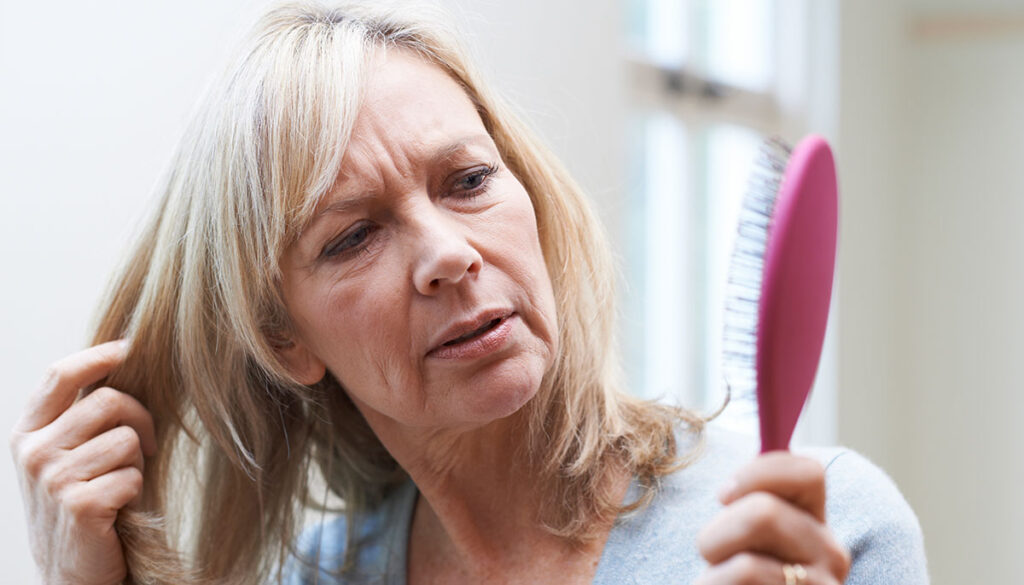
Traction Alopecia
Traction alopecia happens when your hairstyle causes damage to the roots of your hair by rubbing or pulling. Eventually, the follicles can become so damaged that hair won’t grow back even if you change how you style it.
Although traction alopecia can impact anyone who wears wigs, tight ponytails, braids, or extensions, it’s especially common in Black women. Protective hairstyles, such as locs and braids, along with weaves and wigs can all place stress on hair follicles. I won’t claim to be qualified to dive into the complicated emotional, political, and cultural issues surrounding this issue, but Shalwah Evans penned an excellent essay about it for Essence.
Evans points out that although Black hairstyles can damage hair follicles, it’s just one small piece of a bigger picture that involves hormones, stress, and genetics. “Black women should feel neither ashamed nor embarrassed, or feel like they shouldn’t seek help because something they did caused them to lose their hair,” she writes.
Certain Medications
Quite a few common medications can cause telogen effluvium, a condition where an unusual percentage of your hair follicles go into the telogen (or resting) phase of the growth cycle. When this happens, otherwise healthy, growing hairs fall out and new hair can’t grow fast enough to replace them.
Medications that have been known to cause this type of hair loss include blood thinners, beta-blockers, ACE inhibitors, hormonal birth control, and some antidepressants. You can check out a more complete list here.
Of course, chemotherapy also causes hair loss. Chemotherapy drugs attack not only cancer cells but also the cells in your hair follicles. This causes the hair to fall out. Not all chemo drugs cause hair loss, and the hair should grow back in three to six months.
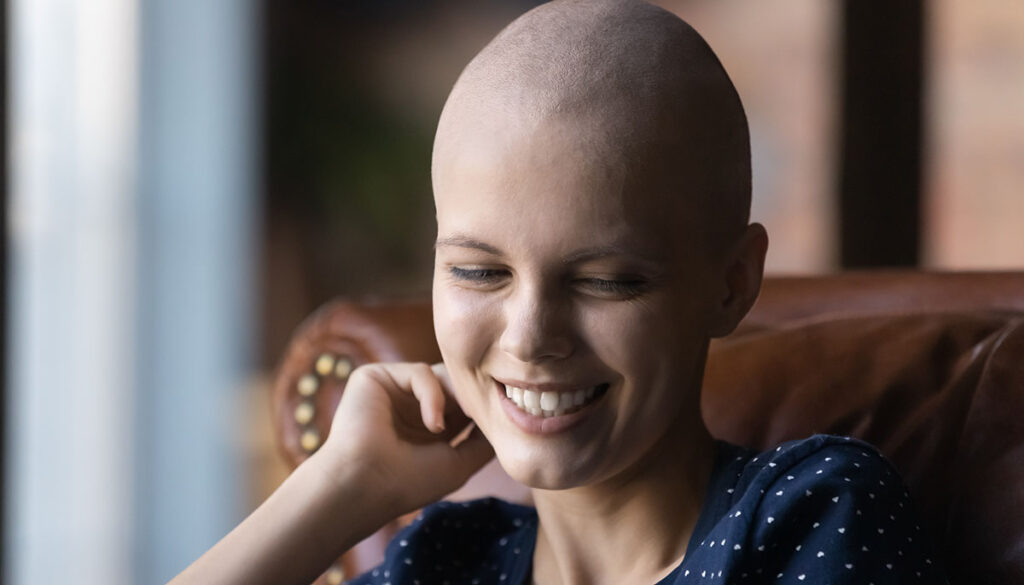
Excess Stress
You’ve heard the phrase “tearing out your hair” before, but stress can actually cause hair loss. According to the Mayo Clinic, stress can trigger three different types of hair loss. The first is telogen effluvium—the same kind of hair loss caused by medications and some illnesses. Another is alopecia areata, an autoimmune condition where your body attacks healthy hair follicles, causing hair to fall out in patches.
Finally, stress can cause trichotillomania, a disorder where you feel compelled to pull out your own hair, in some people. As Daniel K. Hall-Flavin explains for the Mayo Clinic, “Hair pulling can be a way of dealing with negative or uncomfortable feelings, such as stress, tension, loneliness, boredom or frustration.”
Taking steps to manage your stress levels is a good first step, but you should also consider talking to your doctor or a mental health professional—especially if you’ve been pulling out your own hair.
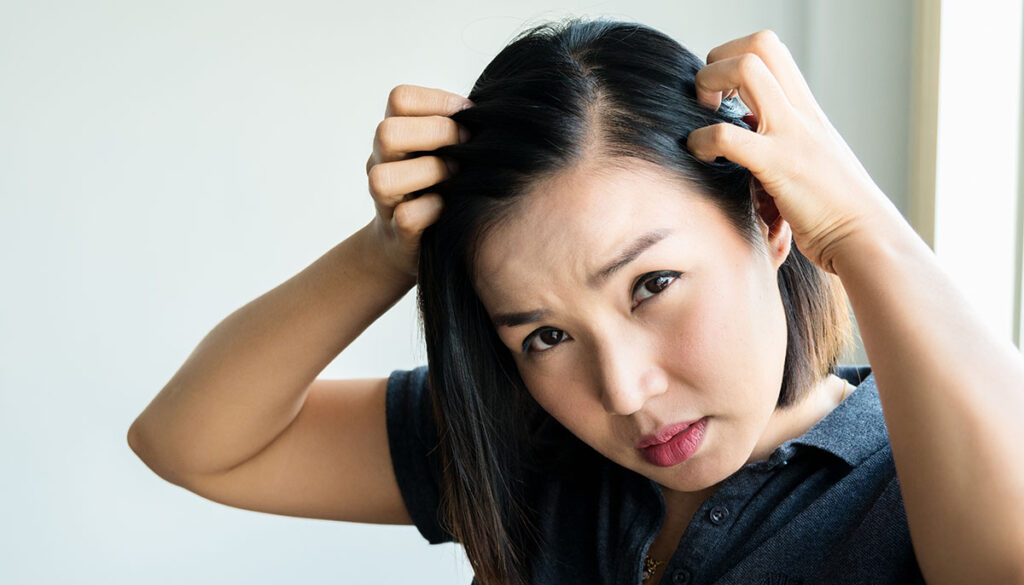
Post-Partum Hair Loss
Many new mothers will experience abnormal hair shedding a few months after welcoming their babies to the world. The cause is all down to hormones. During pregnancy, all that extra estrogen causes hair to stay in the anagen (or growing) phase for much longer. That’s what causes some moms-to-be to have longer, thicker hair during pregnancy.
Unfortunately, those luscious locks can’t last. As estrogen levels normalize, the usual hair lifecycle restarts. The result is more shedding than normal, but eventually, your hair should go back to normal. If you’re still experiencing excessive hair loss after your baby’s first birthday, then talk to your doctor about possible causes.
Polycystic Ovarian Syndrome
Anyone who has dealt with PCOS knows that it wreaks havoc on your entire body. In addition to weight gain and acne, the outward symptoms of PCOS include losing the hair on your head—and gaining hair on the rest of your body.
This disease causes your body to make extra androgens (male hormones such as testosterone), which results in the kind of baldness pattern more often seen in men. If you think you might have PCOS, then you should definitely talk to your doctor about it.
Other Medical Conditions and Deficiencies
Telogen effluvium—the condition where more hair than usual enters the shedding and rest period—can be caused by a number of other conditions. Iron deficiency anemia is a common cause of hair loss in women. So is restrictive dieting. Fevers can cause this type of hair loss as well. And don’t forget an under- or over-active thyroid, both of which can trigger alopecia.
Basically, anything that throws your hormones out of whack or causes a traumatic shock to your body can result in temporary hair loss. You can see now why it’s so common. What still doesn’t make sense, however, is how reluctant most women are to talk about it.
Learning to Cope with Hair Loss as a Woman
Most of the hair loss conditions we just talked about are gradual—and that’s what makes them difficult to catch early. At first, you might not even notice what’s happening. Then, a growing sense of worry sets in. You start checking your part multiple times a day to determine if it’s really getting wider. Is your scalp more visible now than it was last week? Are you losing your hair—or your mind?
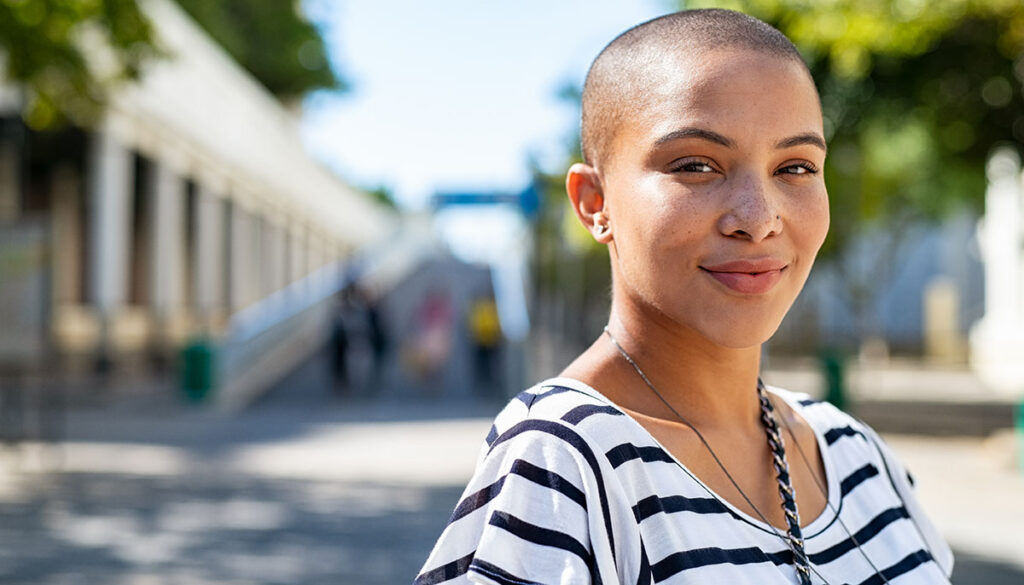
That’s how I experienced it, anyway. I lost quite a bit of hair last year during a stressful period in my life. I’d also started taking a medication that causes hair loss—a side effect that I wasn’t aware of until it was too late. On days when I felt self-conscious, I’d wear a scarf over my hair or sweep it to the side in a dramatic side part.
I’m grateful that my hair is starting to grow back now. But for many women, hair loss is an ongoing problem with no end in sight. Some causes of hair loss are temporary, and you’ll see regrowth in three to six months once the root cause—excuse the pun—is cured. But others are more complicated and difficult to treat. Chronic or permanent hair loss isn’t uncommon in women, and it’s important that we start talking about it with compassion and openness.
Hair isn’t just hair. It’s our “crowning glory,” a biblical phrase that certainly doesn’t make those of us who have experienced hair loss feel any better. In many cultures, a woman’s hair is a symbol of her femininity and the bedrock of her identity. It reminds me of a different bible story, actually. Samson’s power comes from his long, flowing hair, so Delilah cuts it while he sleeps. If you’ve ever woken up with hair on your pillow or stared at yourself in the mirror, trying to recognize the stranger you see, then you know that hair really does have power.
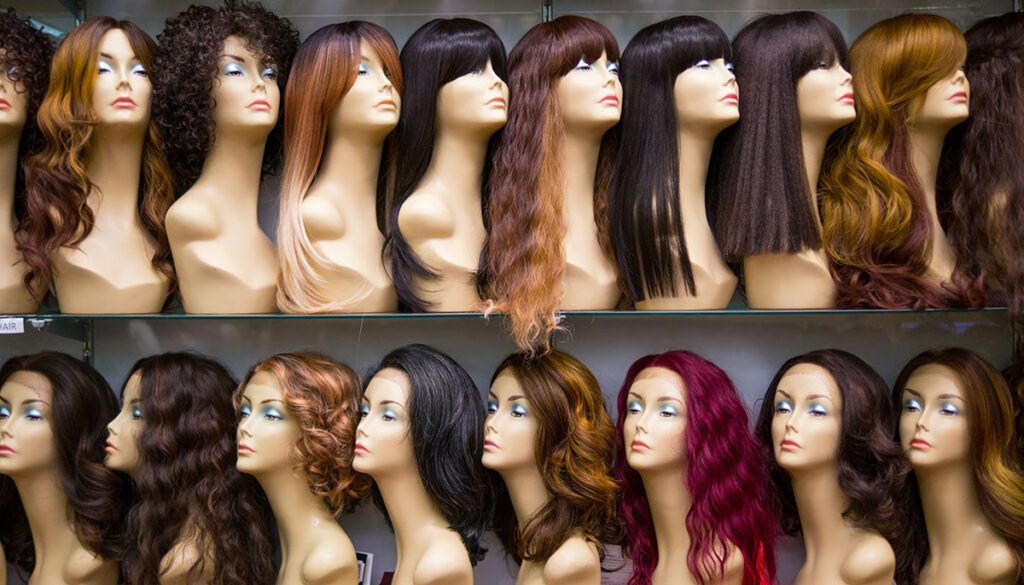
The decision whether to hide your hair loss or embrace it is a deeply personal one, and there’s no correct answer. You may even find that your feelings change from day to day. There may be times when you prefer to wear a wig or a scarf, while other days you feel confident. A talented hairstylist can help you mask a widening part, or you can decide to grab the clippers and go totally bald. Those decisions are yours alone. What’s important is that you talk about it.
Talk to your loved ones about how you are feeling and how they can support you. Well-meaning friends and family may offer unsolicited advice or, worse, completely refuse to acknowledge the elephant in the room, so initiating that conversation can help. Consider joining a support group with other women who are dealing with hair loss, too. Talking about it can make a big difference in the isolation, shame, and fear that many women feel when they lose their hair. You could also read stories that others have shared, like these women who spoke to Elle.
You’re not alone. Regardless of the cause of your hair loss, there are 30 million other women out there right now who are struggling right along with you. And while there will always be “comedians” who think it’s funny to kick a woman while she’s down, there are so many more people who will lift you up.













